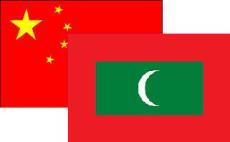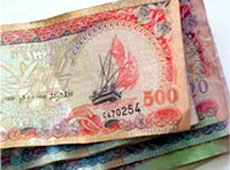President Mohamed Waheed has requested parliament approval to obtain a US$29.4 million loan from the Bank of Ceylon to finance the government’s budget and manage cash flow.
The Ministry of Finance and Treasury is seeking to secure the loan as a way to “enforce” the 2013 budget approved by parliament, stated a letter from the President’s Office read during a parliament session held on Tuesday (August 13).
The Finance Ministry informed the President’s Office that the Bank of Ceylon would provide the Maldives’ government a loan of US$29.4 million, at a six percent interest rate, to be repaid within six years in monthly payments of US$490,000, according to local media.
The Government of Maldives believes the short term loan offers “good terms” and will provide the support necessary to finance the state budget and cash flow. The President’s Office letter also noted that the graduation of the Maldives from least developed country status has made it “extremely difficult” to obtain loans with low interest rates.
Previously, upon parliament’s approval of the 2013 budget, it was agreed that the state could not take out loans with interest rates that exceed seven percent.
The President’s Office Bank of Ceylon loan request has been forwarded to parliament’s finance committee.
Foreign loans for “fiscal problems”
In 2012, President Waheed reportedly said he would not resort to borrowing from foreign governments in order to finance government activities.
“I will not try to run the government by securing huge loans from foreign parties. We are trying to spend from what we earn,” he was reported to have told the people of Nilandhoo Island.
However, the government has sought a number of foreign loans to supplement the state budget.
Last month, the government confirmed it was in discussions with Saudi Arabia, seeking a long-term, low interest credit facility of US$300 million to help overcome “fiscal problems”.
President’s Office Spokesperson Masood Imad confirmed President Waheed had held discussions with senior Saudi Arabian dignitaries including Crown Prince Salman bin Abdulaziz Al Saud over the proposed credit facility, during his recent visit to the country.
“The president has initiated the talks so it is just a matter of working out the details now,” Masood said, explaining that the funds would be used for “budget support” and development projects.
 In September 2012, President Waheed told Reuters that China will grant the Maldives US$500 million (MVR7.7billion) in loans during his state visit to the country.
In September 2012, President Waheed told Reuters that China will grant the Maldives US$500 million (MVR7.7billion) in loans during his state visit to the country.
The loans, equal to nearly one quarter of the Maldives’ GDP, would include $150 million (MVR2.3billion) for housing and infrastructure, with another $350million (MVR5.4billion) from the Export-Import Bank of China, reported Reuters.
China’s aid was hoped to provide an immediate salve to the government’s financial ailments, which at the time included a MVR 9.1 billion ($590million) budget deficit.
Additionally, the government was seeking a US$25 million state loan from India required to support the state budget for the remainder of 2012. The loan was delayed after the Maldives’ government failed to submit the requested paperwork, a diplomatic source from the Indian High Commission in the Maldives previously revealed.
The US$25 million loan was agreed as part of the $US100 million standby credit facility signed with Prime Minister Manmohan Singh in November 2011.
It is not clear whether the foreign loans from India and China have been received, or whether parliament has approved the state obtaining loans from Saudi Arabia or Sri Lanka’s Bank of Ceylon.
Finance Minister Abdulla Jihad as well as Deputy Speaker, Parliamentary Financial Committee Head, and People’s Alliance (PA) MP Ahmed Nazim were not responding to calls at time of press.
Failure to fill budgetary gaps
Finance Minister Abdulla Jihad claimed back in late December 2012 that the MVR 15.3 billion (US$992 million) state budget approved by parliament might not last until the end of 2013 – requiring supplementary finance for the state.
In April 2013, Jihad sought authorisation from parliament to divert MVR 650 million (US$42 million) allocated for infrastructure projects in the budget to cover recurrent expenditures.
Jihad warned that government offices and independent institutions might be unable to pay salaries or electricity and phone bills if funds were not transferred from the MVR 1.8 billion (US$117 million) Public Sector Investment Programme (PSIP).
electricity and phone bills if funds were not transferred from the MVR 1.8 billion (US$117 million) Public Sector Investment Programme (PSIP).
Earlier in April, Jihad also announced that the government had decided to delay all new development projects that were to be financed out of the state budget due to shortfalls in revenue.
The decision to suspend new projects was revealed after Housing Minister Dr Mohamed Muiz told local media at the time that he had been instructed not to commence any further infrastructure projects included in the 2013 budget, such as harbour construction or land reclamation.
“Reckless financial management”: MDP
In July, Maldivian Democratic Party (MDP) MP and Spokesperson Hamid Abdul Ghafoor said that the heavily partisan parliament now effectively controlled state finances as a result of former opposition politicians – now part of President Waheed’s government – imposing tighter spending restrictions on former President Mohamed Nasheed’s administration.
Ghafoor argued that with the MDP failing to recognise the legitimacy of the present government due to the controversial transfer of power last February, he did not believe there would be support for approving the credit agreement with Saudi Arabia due to the government’s existing extravagant borrowing levels.
The party accused the current government of reckless financial management, pointing to a potential US$1.4 billion compensation bill facing the state for deciding last year to abruptly terminate a US$511 million airport development contract agreed with infrastructure group GMR.
The compensation claim amounts to four times that of the Maldives’ current state reserves should it be awarded by a Singapore court overhearing arbitration hearings between GMR and the government.
“Since we do not see this government as legitimate, we do not see why we should support them,” he said. “They have put us into debt with their handling of the airport development and another bill for a border control system.”
Earlier in July, Malaysian security firm Nexbis invoiced the Department of Immigration and Emigration for US$2.8 million (MVR 43 million) for the installation and operation of its border control system technology in the country, in line with a concession agreement signed in 2010.






Oh but I thought we had money, we gave back all benefits due to the civil service employees which were cut during Nasheed's administration, we promoted the police officers, even gave double promotions to those bashed heads in, we even gave them apartments. What went wrong? Never mind, just blame MDP.
Hang on, where's the US$300 million Waheed got from Saudi Arabia when he went to his recent "Umrah"? Which pocket did that end up in?
Begaaaaaaaaaaaaaaaaaaa!
Get lost!
All the money earned now had to paid to the people who had not been paid by Nasheed for the work that was carried at Addu Convention Center.
Nasheed had wasted all the money that was earned during his regime.
Country debt had gone up to 32 billion in just three years.
These money were given to his associates and close friends.
This is what he called " ogaatheri Sarukaaru"
why waheed harry for the loans from every where. if they get all this loans it will go into peoples who has got long pockets.stop them. after elections new government can take loans.
Where ever the money went...it has gone. We are taking loans to run our country. Lets look at the promises our presidential candidates are making...More loans are on the way. We need to vote for the candidate with least expenditures in their manifesto.
To what end is this loans taken?!!!
To pay for recurrent expenses, no economic development plan, and therefore no long term plan on how to payback. What about next year, a loan from some other bank....
Thos just gives me a forebording sense of doom.
6% from Sri-Lanka,,,bank of England rate is only 1/2%...Are you Maldivians missing something,,or is someone going to get very rich by arangeing this loan.
Kuribee,
Between 2003 and 2007 the govt wage bill was doubled, without any new avenues for revenue. Between 2007 and 2009 that wage bill was double yet again, this during the world economic crisis. Keep in mind, relatively we have one of the the biggest civil services in the world.
The Anni administration came in after this mess was created by the dying regime desperate in their failed attempt to bribe their way into power.
“The Maldives faces the most challenging macroeconomic situation of all democratic transitions that have occurred since 1956,” a report by the World Bank Report titled - 'How did the Maldives get in this situation?' claims, noting that the full level of financial strife “may not be fully appreciated.”
In 2009 the GDP contracted by 3.6%, this was turned around to a growth of 7.1% the following year and another 7% growth in 2011. This happened during the biggest economic crisis the world economy faced in decades. In 2012 Anni "resigned", your experts took over the growth was a paltry 3.4%.
The debt in 2008 was 36.4% of GDP and 66.6% in 2010. But new avenues for revenue was in place, resort rental (which the Waheed govt quickly changed terms in favour of the resort owners), the GST, TGST, business profit tax etc.
Anni spent astronomical amounts on infrastructure, roads, utilities, housing, airports, harbours etc all the while struggling against an obstinate opposition hell bent on scuttling any cost saving measures, be it the decentralisation bill (costing us millions in salaries of useless councillors) or the Civil Service cuts (again millions to unproductive workers).
Then the coup govt threw GMR out, Nexbis out, Tata on the way out. Creating lawsuits and possible liabilities in billions if dollars.
The infrastructure spending by the MDP govt created assets, which in the long run creates business opportunities, stimulating economic growth. Your coup govt has thus far implemented further salary and benefit increases for undeserving police and civil service.
Tell me, which govt would you rather have?
Somehow the recently created Arabian style "Muslims"(during the old days everyone in the Maldives was part of a a joint Muslim society) are creating a new religion. Now there is always talk about money. Is money now the new Islamic goal in the Islands?
- While honesty counts for nothing ?
Just now I see Muslims killing Muslims in Turkey and Egypt, and just about everywhere else. Islam should be a religion of peace and honesty.
Vote for the candidate with most social service and protection, more community projects. We can't bring down the stars or the stuff under the seas. We must be realistic.
Maldives citizens please wake up and speak up. Look at what the government decision makers have done. Who is going to pay all this money back to the lenders? Who? You?
It looks like waned is desperate for cash To hard his campaign
Somehow, it just seems more satisfying to tear down Waheed's campaign efforts now.
Doesn't the Majlis Have a role in this ? At the least, one of oversight?
Was judge Ali Hameed involved in this deal? Perhaps to fund a sequel to his highly successful movie?